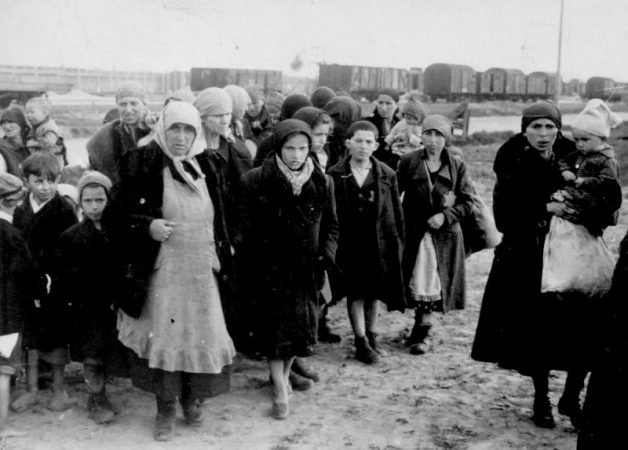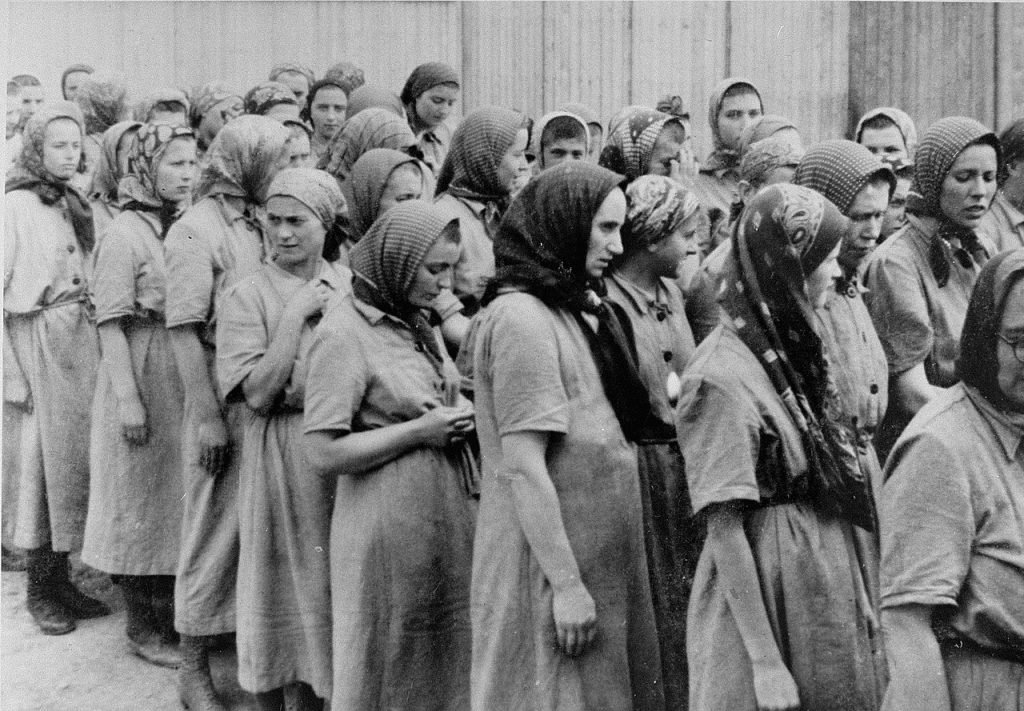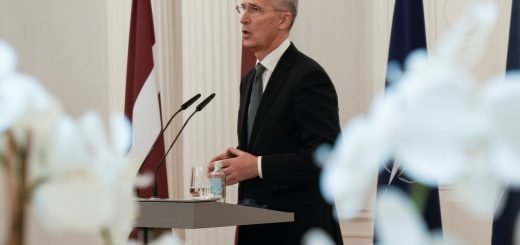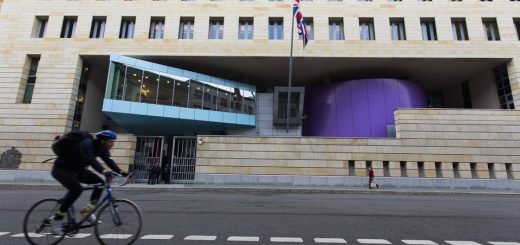Women during Holocaust: Resurrecting the Inescapable Horrors

When power commences broadening its arms it doesn’t spare anyone who arrives into its way and carries a deadliest urge to establish itself. During World War II, Nazi Germany was sailing on the boat of mass-killing and extermination and its ultimate goal was to reach a destination of absolute authority and power. They were working with the objective of creating a world which is racially pure and is synonymous with the power i.e. robust and mechanical. This rational and scientific outlook of the world not just led to the development of the ideology of individualism but also inculcated a practice to retain self-interest at the dominant position.
Holocaust, as we define it today, was not just a mass massacre of the people but was also meant disaster for the people who lived those times and continue to survive today. In a broader sense, it meant the assassination of humanity and the victory of those who had the frenzied desire to create a capitalistic and “modern” world. If the Holocaust brought terror and death to all the people why is there a need to study a specific section of people? There are two arguments to answer this question one that the women history has always been silenced until there was a growth of women historiography which traced and regained consciousness of the women’s voices and the second being that if we study the particular gender we come to know about the individual experiences of the time which were just neglected as “in the whole” experiences of those who were victims of nazi’s nightmare.

The anti-Semitic politics of the German state laid down the contours for hatred towards the Jewish community and further mobilisation of nazis for creating a hell atmosphere for the latter. Around 6 million people were murdered by the nazis due to their frenzied desires and a wilfully taken recourse towards modernization by exterminating the impure race.
The Jewish women’s experienced the brutal murder, were whipped, harassed sexually, became the objects for nazis experimentation and whatnot. But before we discern the miseries of women during the holocaust we need to get ourselves familiarised with the Pre-war roles and responsibilities of the men and women. This is crucial because if we want to know about how men and women resisted and survived during the holocaust we need to be aware of their environment which they lived to lead to a story different for every individual woman. Jewish men and women in the pre-war world lived in a gender-specific context where their roles were pre-defined according to their gender and endowed them with varied knowledge along with the expertise to face nazis onslaught. Men were supposed to be responsible for economic support while the women were left back to take care of their families, children, and home. There were differences within the western and eastern Europe as women in the former region were excluded from the world of businesses, education, and politics whereas in the latter region due to family’s economic downtrodden condition women entered into the economic sphere to support their family. The women in eastern Europe, therefore, were termed as “engine of acculturation” which later assisted them in providing contacts to protect themselves from the nazi assault.
The anticipatory reaction for the nazis terror was thought to bring a maximum of humiliation towards the men and not women as they were facing the direct brunt of the onslaught due to their Jewish appearance in public. This led to the formation of the gender-specific strategies which would save the men and almost negating the hardships of women. The men became more and more dependent upon the women to deal with the public affairs and support the family economically. The women as we can imagine were now exposed to the world outside which demanded more competitive spirit from them to withstand not only the hunger but also the nazi onslaught. However, the picture was not as simple as it was anticipated because women too became the victims of the deadliest nazis attack and were demeaned morally and publically alike men. These women were ordinary women like today who had no weapons to fight off against the power which was devastating on every end.
Nazi Germany passed the anti-jewish laws which led the Jewish men’s to lose their jobs and put a heavy toll upon women to work and take responsibility for the family’s survival. One of the horrific policy enacted by the nazis were to prohibit pregnancies and the birth of Jewish children. The doctors were compelled to report every pregnancy and non-compliance to this led to ultimate death. This is making apparent that now Nazis held the totalitarian power which was aimed at controlling the people, particularly Jewish people lives according to their own desires. They had the conception of the state where only the reasonable, rational and pure man will survive while others will be killed as they don’t fit into their perfect world.
The selection process on the arrival ramp of the concentration camp is the example of how low power can stoop to flourish itself. The women in the Auschwitz were selected rather forced to go either to the side leading towards the gas chamber or to the other side where they have to toil laboriously until they die. In both of the case awaited the death. The selection process was done by segregating the one who could work under the fatal condition from the one who is vulnerable. Women who had children in their arms were asked to lead towards the gas chambers even if they were fit as nazis did not want any Jewish children to outlive. Women in Eastern Europe faced much more violent conditions as they found jobs in ghetto factories, private cleaning, laundries etc. This increasing supply of women labour led to job shortages and the families were here left starving to death. There is evidence of women’s turning into hazardous and “illegal occupation” of smuggling as the only way left to them for feeding their children. There are tales of the desperate sacrifice of mothers to keep their young one’s alive.

Women who were selected for work were forced to shed clothing and stand naked and exposed in front of German male patrols. They were shaved and tattooed with the numbers. This was incredibly traumatic and humiliating for the Jewish women’s who stood helplessly facing the assault and the shame. Men were not as emotionally distraught as their female counterparts.
There are accounts which highlighted the Jewish Women’s resistance. There was a small group of women who were termed as “free” (Young and single as they had no children or familial pressure) to participate in the resistance in the ghettos along with their male counterparts. The women also assumed the leadership position and are commemorated today for their powerful heroic stand to protect the Jewish honour. Women also played critical roles ranging from the establishment of the illegal school, secret libraries to organising cultural events and initiating the rescue plan for other Jews. One of the most popular resistance group was cherished as kashariyat which is revered widely for smuggling the news, information, money, food, medical supplies among many others outside the ghettos of Eastern Europe. These women were often disguised a non-jews and were recognised for delivering help to jews and salvaging them from the doomed ghettos. The young women who resisted were glorified for their heroism as they provided monetary, economic, and moral support to the Jewish community. The appearance of “camp sister” relationship where women supported each other and sustained themselves was an outstanding sample of unity.
There are multiple literary accounts by which bear the testimony of Holocaust experience as women faced it. These accounts captured the unrest both in the during and after the war. They continue to provide the details of everyday life under nazis nightmare and of abnormal circumstance. The first wave of women’s memoirs came by the beginning of the 21st century which narrowed down the focus on women alongside bringing out both the distinctions and commonality in Jewish men’s and women’s experiences. One of the widely read and popular memoirs among many others is of Anne Frank-The Diary of Young Girl. Anne Frank was a young Jewish girl who with her family fled to the Netherlands because of nazis terror and dwelled in isolation from then onwards. She documented her experience in her dairy and detailed out how life looked like in the war period where one waits for inevitable death. She explores her inner self which can be visible through her candid discussion emotions which every adolescent face. Her death reflected not only the absurdity with which nazis acted but also meant the personal and individual loss to those who met her through her diary.

Eva Mozes Kor and her twin sister were the victims and survivors of the Nazi doctor Josef Mengele human experiments. Eva as a survivor talks about the series of emotions and experienced she faced during her enslavement in Auschwitz concentration camp. In the first world war when Germany faced defeat they felt humiliated painfully and started blaming jews for their defeat which ultimately led them to exterminate and murder the jews across Europe. The anti-semitism became so strong that school days became torture for Eva and many other children alike. The number of concentration camp grew and the millions of nazis were detained and annihilated within the camps. For Eva and her twin sister, the experiment by doctor Mengele (also known as “angel of death”) was no less than death. Eva is now widely recognised for her organization CANDLES an acronym for children of Auschwitz nazi deadly lab experiments where she is determined to raise the voices of the children who were saved from ashes and to not let the world forget about what happened in Auschwitz. She came under question when she said publicly that she has forgiven nazis for what they have done as she believes that the power of forgiveness can lead the pathway towards self-healing and empowerment and anger only unleashes hatred and violence.
As we all dwell amidst the unpredictable world where nothing is certain we need to learn from the past which brings into forefront those issues which can be significant to not only understand the present better but also make an apprehension about how power politics can shape its career in future. When power begins enlarging itself no one can flee from the brutality, violence, and venom it dissipates. Peace and negotiation is, henceforth, the path through which one can halt any future holocaust to happen which leaves an indelible imprint on the human mind.



















